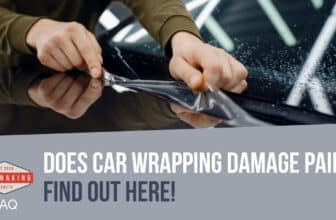
Car wrapping is a popular choice among automotive enthusiasts looking to customize their vehicles. It offers numerous advantages, including the ability to protect the original paintwork while allowing for customization. With a wide range of colors and finishes available, car wraps provide a unique and personalized look for every owner.
One of the main benefits of car wrapping is its temporary nature. Unlike traditional paint jobs, vinyl vehicle wraps can be easily removed without damaging the underlying paint. This flexibility allows owners to change the appearance of their vehicles whenever they desire.
Additionally, car wraps act as a protective shield against chips, scratches, and other damages caused by the road. They are durable and resistant to dirt and debris, making maintenance and cleaning a breeze.
However, it’s important to consider the quality of the wrap and installation. Poor-quality materials or improper installation can lead to issues such as fading or peeling over time. It is recommended to seek professional installation for optimal results.
In this article, we will explore the pros and cons of car wrapping, the various customization options available, and the cost comparison between car wrapping and traditional paint jobs.
The Art of Car Wrapping
Various Options for Car Wraps
Car wraps offer a range of options to suit different preferences and needs:
- Full Wrap: Covers the entire vehicle, providing maximum customization opportunities.
- Partial Wrap: Covers specific areas of the car, allowing for targeted design elements.
- Color Change Wrap: Gives the vehicle an entirely new hue for a complete transformation.
- Printed Wrap: Allows for intricate designs or advertising messages on the car.
Personalization in Car Wrapping

Car wrapping provides the ability to customize every detail according to personal preferences. From vibrant colors and patterns to logos or graphics like the ones you get at SignSilo.com, the options for personalization are endless.
The Process Unveiled

The process of car wrapping involves several steps:
- Surface Preparation: Thoroughly clean and prepare the surface by removing dirt, grease, and wax residue.
- Vinyl Application: Skilled technicians apply the vinyl wrap using specialized tools, ensuring proper adhesion without air bubbles or wrinkles.
- Trimming & Finishing Touches: Excess material is meticulously trimmed away for seamless edges and corners.
- Curing Time: The vinyl wrap needs time to cure fully, typically taking a few days.
Professional installation is highly recommended for optimal results, as experienced technicians have the necessary expertise and tools to ensure a flawless finish.
Benefits of Car Wrapping
Protection of Original Car Paint

Car wrapping acts as a protective layer against scratches, stone chips, and other minor damages. It helps preserve the original paintwork, increasing the resale value of the vehicle.
Cost-Effectiveness Compared to a Paint Job
Car wrapping is a more affordable option compared to a full repaint. It also allows for easy removal or changes in design or color preferences without damaging the vehicle’s surface.
Easy Maintenance and Cleaning
Maintaining a wrapped vehicle is relatively simple due to the smooth surface texture of vinyl wraps. They are resistant to dirt and debris buildup, making cleaning hassle-free.
Provides Unique and Personalized Look
Car wraps offer endless customization options, allowing owners to create a truly personalized look. From colors and finishes to patterns and textures, the possibilities are limitless.
Increased Advertising Opportunities
Car wrapping presents a unique advertising opportunity for businesses. By applying custom graphics or company logos on the vehicle’s surface, they can effectively turn their cars into moving billboards.
Drawbacks of Car Wrapping
Protects Your Original Paint
Car wrapping shields the original paint from scratches, UV rays, and environmental damage, preserving its pristine condition.
Cost-Effective Alternative
Car wrapping offers a more affordable solution compared to traditional paint jobs. It provides high-quality results without breaking the bank.
Easy Maintenance
Keeping a wrapped vehicle clean is hassle-free. Vinyl wraps are resistant to dirt and debris buildup, making them easy to clean with soap and water.
Customization Options Galore
Car wraps provide endless possibilities for customization. From vibrant colors and patterns to matte finishes or textured effects, owners can create a unique and personalized look.
Advertising Opportunities
Car wrapping allows businesses to turn their vehicles into mobile billboards, effectively reaching wider audiences wherever they go.
Temporary Changes
Car wraps offer the flexibility of temporary changes to the vehicle’s appearance without any long-term commitment. Owners can experiment with different colors or designs and easily revert back to the original look.
Cost Analysis: Car Wrapping vs. Traditional Paint Job
Cost Comparison: Car Wrapping vs. Traditional Paint Job
When deciding between car wrapping and a traditional paint job, it’s important to consider the cost implications. Here’s a breakdown of the factors to consider:
Factors Impacting Car Wrapping Costs
- Vehicle Size: Larger vehicles require more material for wrapping, increasing the overall cost.
- Design Complexity: Intricate designs may require additional time and expertise, adding to the cost.
- Wrap Material Type: Different vinyl wrap materials come at various price points, with higher quality options offering better durability.
- Additional Services: Graphic design or removal of existing wraps may incur extra costs.
Long-Term Cost Benefits of Car Wrapping
- Preserves Original Paint: Car wrapping protects the original paint from sun exposure and everyday scratches, increasing the vehicle’s resale value.
- Lower Maintenance Costs: Car wraps require minimal maintenance compared to regular waxing and polishing needed for traditional paint jobs.
- Easy Repairs/Replacements: Damaged sections can be easily repaired without redoing the entire wrap job.
- Cost-Effective Customization Options: Car wraps offer endless possibilities for customization at a fraction of the cost compared to custom paint jobs.
While there are upfront costs associated with professional car wrapping services, they offer long-term benefits that traditional paint jobs cannot match. By considering these factors against the advantages offered by car wrapping, you can make an informed decision about whether it’s right for you.
Choosing the Right Car Wrap Provider
Comparing Costs: Car Wrapping vs. Traditional Paint Job
When choosing a car wrap provider, it’s important to compare the costs of car wrapping and traditional paint jobs. Here are some factors to consider:
Cost Comparison
- Car Wrapping: The price of car wrapping can vary based on factors such as vehicle size, vinyl type, design complexity, and labor costs. On average, a full car wrap can range from $2,000 to $5,000.
- Traditional Paint Job: A professional paint job for the entire vehicle typically starts at around $3,000 and can increase based on material quality and additional customization or repairs.
Factors Impacting Car Wrap Costs
- Vehicle Size: Larger cars require more material and labor time for wrapping, affecting the overall cost.
- Vinyl Material: Different types of wraps come at varying prices based on durability and finish.
- Design Complexity: Elaborate designs may raise costs due to increased installation labor.
- Removal Expenses: Consider potential removal costs if you plan on changing or removing the wrap in the future.
Long-term Cost Benefits of Car Wrapping
- Preservation of Original Paint: Car wrapping protects your vehicle’s original paint from UV rays and environmental damage.
- Lower Maintenance Costs: Car wraps require minimal maintenance compared to regular waxing and polishing needed for traditional paint jobs.
- Easy Repairs/Replacements: Damaged sections can be easily repaired without redoing the entire wrap job.
- Cost-Effective Customization Options: Car wraps offer endless possibilities for customization at a fraction of the cost compared to custom paint jobs.
By considering these factors, you can make an informed decision about whether car wrapping is the right choice for you. Consulting with professionals will provide further insights tailored to your specific needs and budget considerations.
Conclusion: Is Car Wrapping Right for You?
Cost Analysis: Car Wrapping vs. Traditional Paint Job
When deciding between car wrapping and a traditional paint job, it’s crucial to consider the cost implications. Here’s a summary of the key points:
Factors Impacting Car Wrapping Costs
- Size and Complexity: The size and intricacy of your vehicle will influence the cost of car wrapping.
- Material Quality: The quality of vinyl used for car wraps can vary, impacting durability and lifespan.
- Custom Design Work: Opting for custom designs or graphics on your car wrap may increase the overall cost.
Long-Term Cost Benefits of Car Wrapping
- Preserves Original Paint: Car wrapping protects your vehicle’s original paint from scratches and environmental damage.
- Lower Maintenance Costs: Car wraps require minimal maintenance compared to regular waxing and polishing.
- Easy Repairs/Replacements: Damaged sections can be easily repaired without redoing the entire wrap job.
- Cost-Effective Customization Options: Car wraps offer endless possibilities for customization at a fraction of the cost compared to custom paint jobs.
By considering these factors against the advantages offered by car wrapping, you can make an informed decision about whether it’s the right choice for you. Remember to consult with professionals who can provide accurate quotes based on your specific requirements.


